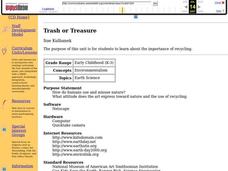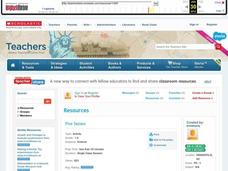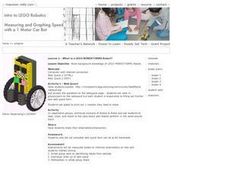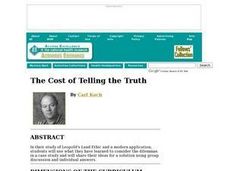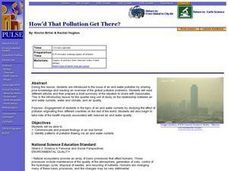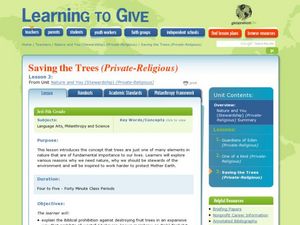Curated OER
Trash or Treasure
Learners explore the importance of recycling. Students are read "Can Kids Save the Earth", they are then guided in a recycling project. Learners discuss Earth Day, and make poster to promote Earth Day.
Curated OER
Making the World A More Beautiful Place: Earth Day
Students study ways to take care of the environment as part of an Earth Day activity. In this environment lesson, student listen to a read aloud of Barbara Cooney's, Miss Rumphius, before discussing how she works alone but is part of an...
Curated OER
Drinkable Snow
Students explore snow. In this forms of water lesson, students read a story about snow, identify the types of snow found in Alaska, and learn Inuit words for snow. The lesson calls for an Intuit Elder to visit the classroom as a guest...
Curated OER
Guess What I Came From
First graders examine items made from plants. In this plant lesson plan, 1st graders read Plants Feed on Sunlight and view a PowerPoint presentation regarding plant growth. Students examine products that are made from plants and draw...
Curated OER
What We Need
First graders identify basic needs of plants. In this plant growth lesson, 1st graders observe types of plants and review the parts of a plant as well as the development of a seed. Students review related vocabulary and read The Carrot...
Curated OER
Five Senses
Learners explore the five senses. In this five senses science and literature lesson, students listen to The Magic School Bus Five Senses book, stopping to identify and discuss each sense. Learners draw and label a picture of their...
Curated OER
What is a LEGO Mindstorm Robot?
In this robots lesson, students explore the LEGO website and complete a web quest. In groups students work in groups and read excerpts from Robots & Robot, chart jobs robots can perform and report their findings to the class. This...
Curated OER
Is Evolution Just Monkey Business?
Students examine the presentation of the theory of evolution in the science classroom. They define and discuss aspects of evolution, evaluate the presentation of evolutionary theory, and write a persuasive essay.
Curated OER
Rock Hounds at Heart
Second graders read "Sylvester and the Magic Pebble" by iam Steig and practice describing rocks using different physical properties. They make observations and develop and describe categories such as texture, color, density, hardness, etc.
Curated OER
The Cost of Telling the Truth
Students examine Leopold's Land Ethic involving illegal river dumping. They consider the dilemmas of the case study and share their ideas for a solution using group discussion and individual answers.
Curated OER
Animal Encyclopedia Search
Students use an online encyclopedia to gather information about animals. They identify habits of ten animals they find interesting. They share their information with the class.
Curated OER
Environment: How'd That Pollution Get There?
Young scholars examine how global wind and water patterns aid in the spread of worldwide pollution. In groups, they read articles about the domino effect of pollution and create posters displaying its journey. On blank world maps,...
Curated OER
Alas, All Human
Students define a scientist. In this ethics and science instructional activity, students read Asimov's Alas, All Human and write responses and discuss the possibilities of imperfection within science by scientists. Students discuss what...
Curated OER
Saving the Trees
Students identify why trees are important. In this environmental lesson, students read the book The Giving Tree and list reasons why humans need trees. Students create a storybook to explain why other natural resources are important to...
Curated OER
Star Party- Closing Lesson
Students study the stars and galaxies. In this universe lesson students complete their unit by participating in an evening bonfire to share what they learned.
Curated OER
Outer Space Creature
Students read poems by Shel Silverstein about planets and outer space. As a class, they compare and contrast his descriptions to actual facts which have been discovered through explorations. They write a description of an outer space...
Curated OER
The Five Senses
Pupils use their senses to identify a variety of items in mystery boxes after listening to a read aloud of Aliki's, "My Five Senses." They taste and smell items to identify them before completing a Senses Literature Log. They label the...
Curated OER
Why Opposites Attract: Observing Magnetic Fields
Students brainstorm background knowledge and any questions they may have about magnetic fields. They investigate the role that William Gilbert had in laying the groundwork for modern experimental science. Students observe magnetic fields...
Curated OER
Berenstain Bears: Grow It
Second graders read several books and complete an activity that coincides with each book. i.e. They read 'Berenstain Bears: Grow It' by Stan and Jan Berenstain and then decorate a flower pot, plant flower seeds in it and record their...
Curated OER
Seasons of Trees
Students examine how trees change over time. In this forestry activity, students read the book The Seasons of Arnold's Apple Tree and choose three trees to observe over a period of time. Students record observations and seasonal changes...
Curated OER
Rainforest Introduction
First graders explore world geography by completing a KWL chart. In this rainforest research lesson, 1st graders read a fictional story discussing a boy who lives in the rainforest. Students analyze the story, identify the plot and...
Curated OER
Swimming with Crabs
Students explore Earth science by completing several graphic organizer activities in class. In this oceanography lesson, students research ocean inhabitants such as blue crab and oysters. Students complete graphic organizers about the...
Curated OER
Sharing the Joy of a Garden
Students see that a garden is a place where an individual can go for inner peace and solitude. They discover that a garden is to be shared. Students describe the importance that a garden has to the environment and lives of individuals...
Curated OER
Go Jump In The Lake!
Learners experiment with local lake water to determine the health of the lake waters. They explore the human impact on the lake water, hypothesize and share inferences in a scientific report.


